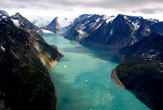
About 130,000 years ago, an ice age ended and there was a period of few centuries before the next one began. During this lull, Earth's temperature warmed, glaciers retreated and ice sheets melted. Sea levels rose by up to 20 feet.
Scientists warn that this could happen again—and soon. But while the last great thaw was the result of a natural tilt in the Earth's axis towards the Sun, the next one will be caused by humans, some scientists argue.
If global warming continues at its current pace, by 2100 Earth could be up to 8 degrees Fahrenheit warmer than it is today. If steps are not taken soon to reduce greenhouse emissions, the Arctic will be as warm as it was 130,000 years ago and similar rises in sea level will occur, according to two new studies released today.
"Although the focus of our work is polar, the implications are global," said Bette Otto-Bliesner from the National Center for Atmospheric Research (NCAR) in Colorado, who was involved in both studies. "These ice sheets melted before and sea levels rose. The warmth needed isn't that much above present conditions."
The findings are detailed in the March 24 issue of the journal Science.
Antarctica's role
The studies are the first to definitively link Antarctica to the sea level rises that occurred between the last two ice ages, the researchers say.
Get the world’s most fascinating discoveries delivered straight to your inbox.
Called the Last Interglaciation, this period lasted from about 129,000 to 116,000 years ago. Scientists had previously known that meltwater from Greenland and other Arctic ice sheets were important factors in sea level rises during this period, but it was unclear what Antarctica's contribution was.
The new results, which draw upon a combination of computer simulations and paleoclimate records, suggests that Arctic melting caused sea levels to rise by up to 11 feet during the Last Interglaciation.
This in turn triggered melting in Antarctica, causing sea levels to rise further.
Rising seas
The researchers combined a computer climate prediction model, the NCAR-based Community Climate System Model (CCSM), with ice sheet simulations to estimate what the Earth's climate was like 130,000 years ago.
They crosschecked the computer's estimates with data from natural records of ancient climate change such as sediments, fossils and ice cores.
All the methods indicated similar warming. However, the computer model showed meltwater from Greenland and other Arctic sources raising sea levels by only about 11 feet, while coral records indicate that the sea level actually rose up to 20 feet.
The researchers think this discrepancy can be explained by meltwater from Antarctica, which could have caused sea levels to rise by another 6 to 10 feet.
Rising seas from Arctic meltwater would have destabilized ice shelves in Antarctica, causing them to melt or break apart and fall into the ocean.
"It's just like throwing a bunch of ice cubes into a full glass of water and watching the water spill over the top," said Jonathon Overpeck of the University of Arizona, who was also involved in both studies.
This hypothesis is consistent with earlier studies based on fossilized microscopic marine organisms, which showed that parts of the West Antarctic Ice Sheet disappeared at some point over the last several hundred thousand years.
3 feet per century
Once the researchers were confident that their computer model could accurately simulate past climate conditions, they used it to predict future climate change.
"Getting the past climate change correct in these models gives us more confidence in their ability to predict future climate change," Otto-Bliesner said.
The researchers concluded that if greenhouse gas emissions are not curbed and we continue with "business as usual," Arctic temperatures will become at least as warm as it was during the Last Interglacial.
If this happens, humanity will be committing the planet to a sea level rise as drastic as, or worse than, the 20-foot increase that occurred 130,000 years ago, Overpeck said.
"Paleoclimatic data shows that we could get 3 feet of sea level rise per century," he told LiveScience. "That's what we would be triggering later in the century. We'd be committing to a sea level rise of that magnitude."
Currently, global sea level rises at a rate of about an inch per decade.
Not too late
Scientists warn that if the warming seen 130,000 years ago occurred today, it would be accelerated by global warming and other human activities.
"The ocean is the vehicle by which this heat is getting to the edges of the ice sheets, so if you increase the rate at which you're putting heat into the ocean, then it would further accelerate the melting," said Robert Bindschadler, a glaciologist at NASA's Goddard Space Flight Center who was not involved in the study by Otto-Bliesner and Overpeck.
Bindschadler is the author of another study, also published in this week's issue of Science, which shows how glaciers can be melted from below by pockets of warm water.
The pace of Arctic melting would also quicken because of pollution-darkened snow, scientists say, which absorbs more sunlight and melts faster than regular snow.
The process will become irreversible sometime in the second half of the 21st century unless steps are taken in the next few decades to curb greenhouse gas emissions, Overpeck said.
"We need to start serious measures to reduce greenhouse gases within the next decade. If we don't do something soon, we're committed to four-to-six meters (13 to 20 feet) of sea level rise in the future."
- Conflicting Claims on Global Warming and Why It's All Moot
- Baffled Scientists Say Less Sunlight Reaching Earth
- Global Warming Nears Critical Point of No Return, Group Says
- Arctic Summer Could be Ice-Free by 2105
- How Global Warming is Changing the Wild Kingdom
- Greenland Dumps Ice into Sea at Faster Pace
Hot Topic
The Controversy
- Conflicting Claims on Global Warming and Why It's All Moot
- Baffled Scientists Say Less Sunlight Reaching Earth
- Scientists Clueless over Sun's Effect on Earth
- Greenhouse Gas Hits Record High
- Key Argument for Global Warming Critics Evaporates
The Effects
- Greenland Melts
- Ground Collapses
- Allergies Get Worse
- Rivers Melt Sooner in Spring
- Increased Plant Production
- Animals Change Behavior
- Hurricanes Get Stronger
- Lakes Disappear
- Seas Rise
The Possibilities
- More Rain but Less Water
- Ice-Free Arctic Summers
- Overwhelmed Storm Drains
- Worst Mass Extinction Ever
- A Chilled Planet
Strange Solutions


